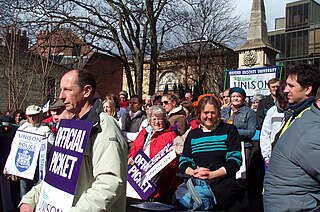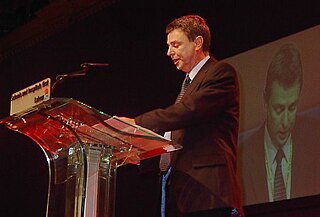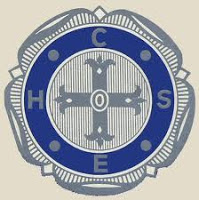
Unison is a British trade union. Along with Unite, Unison is one of the two largest trade unions in the United Kingdom, with over 1.2 million members who work predominantly in public services, including local government, education, health and outsourced services.
The International Brotherhood of Electrical Workers (IBEW) is a labor union that represents approximately 820,000 workers and retirees in the electrical industry in the United States, Canada, Guam, Panama, Puerto Rico, and the US Virgin Islands; in particular electricians, or inside wiremen, in the construction industry and lineworkers and other employees of public utilities. The union also represents some workers in the computer, telecommunications, and broadcasting industries, and other fields related to electrical work.

The National Union of Public Employees (NUPE) was a British trade union which existed between 1908 and 1993. It represented public sector workers in local government, the Health Service, universities, and water authorities.

Trade unions in the United Kingdom emerged in the early 19th century, but faced punitive laws that sharply limited their activities. They began political activity in the late 19th century and formed an alliance with the Liberal Party in the early 20th century. The grew rapidly 1900 to 1920, lost their legal disabilities, and were well established by the 1920s. Union members largely switched from Liberal to the new Labour Party. Its leader Ramsay MacDonald became prime minister in 1924 briefly, and then again in 1929. In the 1980s Margaret Thatcher's Conservative governments weakened the powers of the unions by making it more difficult to strike legally. Most British unions are members of the TUC, the Trades Union Congress, or where appropriate, the Scottish Trades Union Congress or the Irish Congress of Trade Unions, which are the country's principal national trade union centres.

David Prentis, Baron Prentis of Leeds is a British trade unionist and former General Secretary of UNISON, the United Kingdom's largest trade union. He was originally elected in 2000. He was re-elected in March 2005 with 77% of the vote, in 2010 with 67% of the vote, and in 2015 with 49% of the vote.

The Modern Records Centre (MRC) is the specialist archive service of the University of Warwick in Coventry, England, located adjacent to the Central Campus Library. It was established in October 1973 and holds the world's largest archive collection on British industrial relations, as well as archives relating to many other aspects of British social, political and economic history.

UIA Mutual was a mutual insurance company in the United Kingdom, providing general insurance products to members of the trade union movement and other not-for-profit organisations. It was a member of the Association of British Insurers, authorised by the Prudential Regulation Authority and regulated by the Financial Conduct Authority. UIA Limited was a wholly owned subsidiary, authorised and regulated by the Financial Conduct Authority.
Alan Raymond Jinkinson was a British trade union leader.

The Confederation of Health Service Employees (COHSE) was a United Kingdom trade union representing workers primarily in the National Health Service.
Walter Charles Anderson CBE was a British trade union official.
John Simonds was a British trade union leader.
Sir Herbert Edwin Blain was a British trade unionist and political activist.
John Herbert Warren was a British trade unionist.
Levi Clement Hill CBE was a British local government officer who became the first General Secretary of the National Association of Local Government Officers (NALGO), from 1909 until 1943. Though now regarded as a trade union leader, Hill said in 1910 that "anything savouring of trade unionism is nausea to the local government officer and his Association."
John Daniel Daly was a British trade union leader.
The British Union of Social Work Employees (BUSWE) was a trade union representing social workers in the United Kingdom.
The Greater London Council Staff Association (GLCSA) was a trade union representing workers for the London-wide council.
Managerial and Professional Officers (MPO) was a trade union representing senior staff working for local authorities in the United Kingdom.

Christina McAnea is a Scottish trade union leader. She was elected as general secretary of Unison in succession to Dave Prentis, and took up the post on 22 January 2021.
Alison Shepherd is a British former trade unionist.








